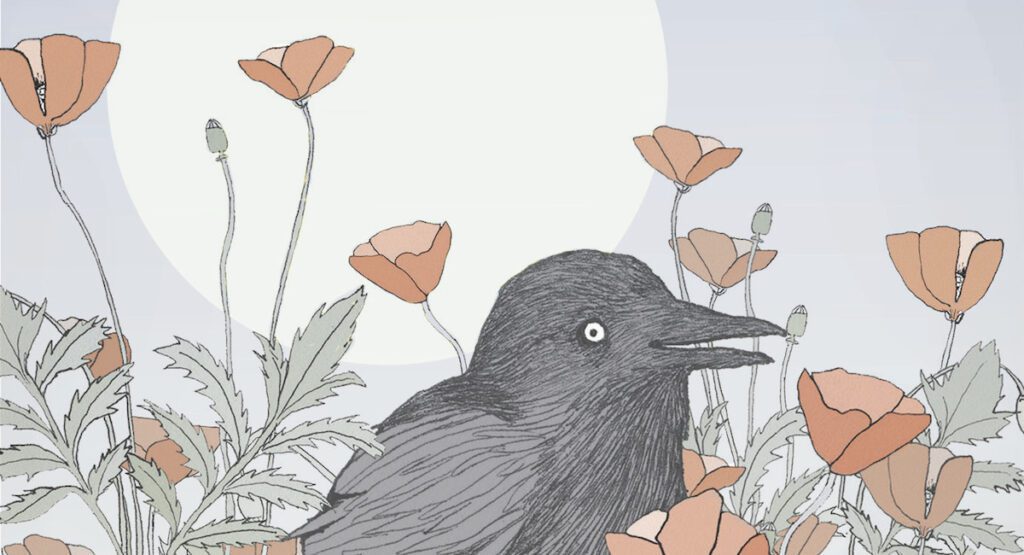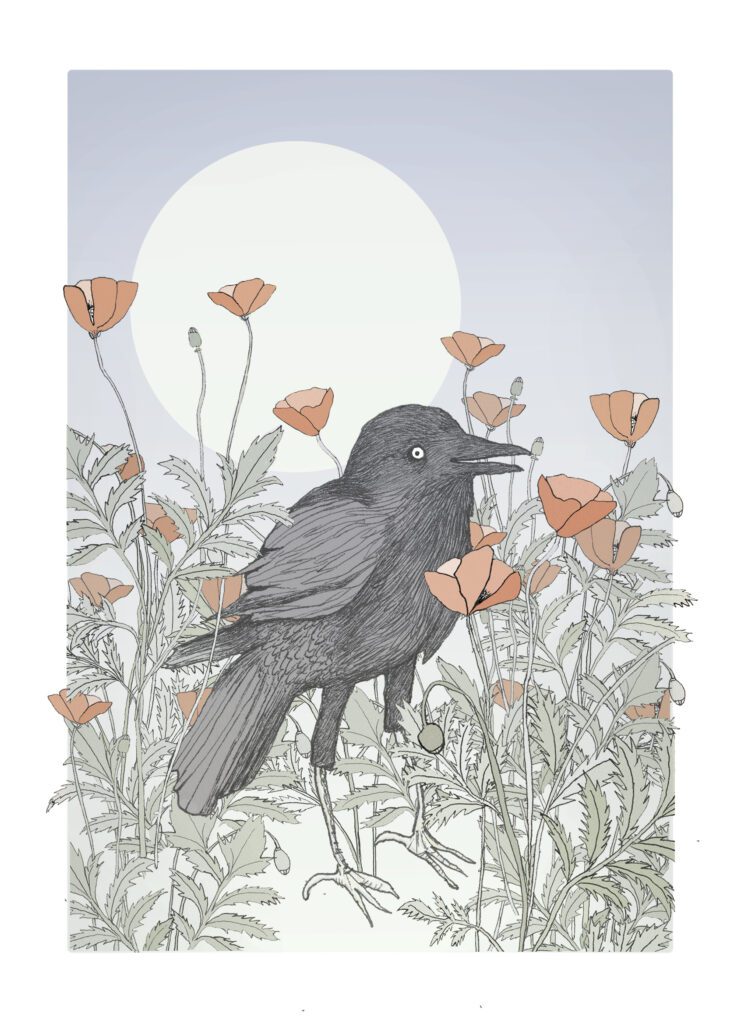
This sermon was given by Katrina Ross Zezza in James Chapel at Union Theological Seminary on November 7, 2019. Katrina is a fellow with the Kairos Center and a student in the Master of Divinity program at UTS. Also included here is a drawing she created as a response to the scripture passage, which appeared in the chapel bulletin on the day of the service.
“For life is more than food, and the body more than clothing. Consider the ravens: they neither sow nor reap, they have neither storehouse nor barn, and yet God feeds them. Of how much more value are you than the birds! And can any of you by worrying add a single hour to your span of life? If then you are not able to do so small a thing as that, why do you worry about the rest? Consider the lilies, how they grow: they neither toil nor spin; yet I tell you, even Solomon in all his glory was not clothed like one of these. For it is the nations of the world that strive after all these things, and your Father knows that you need them. Instead, strive for his kingdom, and these things will be given to you as well. Do not be afraid, little flock, for it is your Father’s good pleasure to give you the kingdom. Sell your possessions, and give alms. Make purses for yourselves that do not wear out, an unfailing treasure in heaven, where no thief comes near and no moth destroys. For where your treasure is, there your heart will be also.” (Luke 12:23–34)
Consider the Ravens
by Katrina Ross Zezza
The problem of how suffering can exist at the same time that God is all good and all powerful is perhaps the most pressing question that people have about God. The passage we read today can be a challenging text for ministerial leaders who are aware of the kinds of suffering that people face — both personal and social — in this society. How is it that Jesus can tell us not to worry, that the kingdom is among us, that we are provided for — when as we look around, it doesn’t seem to be true?
In this country, there are 140 million people living in poverty or low income circumstances. 13.8 million U.S. households cannot afford clean water. And let’s consider the ravens… Populations of mammals, birds, fish, reptiles, and amphibians have, on average, declined by 60% in the last 50 years. Creatures across land, rivers and seas are going extinct as humans pollute and destroy their habitats, while killing them for food in unsustainable numbers.
How can we be authentic faith leaders in a world where life’s goodness is genuinely questionable? I think it is these very questions that Jesus means for us to wrestle with.
In Reformed worship, we respond to a God that offers Godself to us first. God claims us and loves us even before we can talk or affirm any beliefs. These scripture passages help us to know the breadth of God’s grace, that God sees our struggles and loves us so much that we need not worry. In God’s sovereignty, a plan is being revealed gradually that is better than anything we could imagine for ourselves.
But this has also sometimes led to a theology of complacency, in the belief that “God’s got this” — so we needn’t take responsibility for oppressive social conditions of people around us or hold ourselves accountable for the well-being of the earth. Maybe it’s part of God’s sovereign plan that we feel uncomfortable about these things. And maybe it’s part of God’s sovereign plan for that discomfort to call us to action.
Ministerial leaders have a moral obligation to try to improve social conditions and take care of the earth, but what if faith informs how we interact with the world not just because of moral obligation? If we simply view social action as a moral obligation, we risk reducing it to an individualist pursuit of heaven. And we miss the point of spirituality altogether.
“If we simply view social action as a moral obligation, we risk reducing it to an individualist pursuit of heaven.”
I think people who feel called to do justice work, have been inspired not primarily by their own circumstances, but by the circumstances of someone they love. A friend, cousin, brother, parent who was afflicted by the sins of the world — that person is why they keep showing up. It’s not to end their own oppression, it’s because someone they loved was impacted and that person’s suffering affects them so deeply that they are called to find the cause of it… and tear it out at the roots.
The more we open ourselves up to the experiences of others, we sense how they feel, and there is a natural and spiritual calling to attend to their needs. Not because it makes us moral or righteous, but because their pain affects us. We can and do wall ourselves off from the suffering of others. And maybe the more privileged you are, the more you can do that. But this is just an illusion, because we are not separate. The extent to which we wall ourselves off from each other is the extent to which we wall ourselves off from God.
At the same time, it is impossible to actually experience the suffering of the entire world. If we did, we would cease to function psychologically. This is how we are limited as human beings. Individually, we cannot be present to the whole world’s pain, especially if we want to be effective agents of compassion.
But God does not have these same limitations.
Despite our human condition which is unavoidably limited, God reaches out with a limitless supply of grace, and we are called to respond. We are called to attune with and alleviate suffering for each other, to become embodiments of God’s initiative.
What if, collectively, God’s creation can experience and respond to the needs of the whole world? I think this is what Jesus means when he says, “Strive for the kingdom and these things will be given to you.” We can’t use our own reasoning or understanding to know how to bring the realm of God to earth, but we can seek it. And Jesus shows us the way.
Despite humanity’s continued assault on itself and the earth, God is still God, good and loving, and ever present. The sun rises, and creation persists.

For more art by Katrina visit her portfolio at www.katrinaross.net.